
‘Crude’ filmmaker’s raw footage subject to subpoena
A filmmaker’s raw footage is much like a photographer’s unedited images or a reporter’s notebooks—a private record of their reporting that is rarely disclosed to others. On Thursday, a federal judge in New York ruled that a private firm could subpoena the unedited footage used to make a news documentary. The reason? To help the…

Is Brazil the censorship capital of the Internet? Not yet
Last week, Google published its first set of global government request statistics, showing how many demands it receives to remove content from its servers or hand over private information on its users. Transparency by Internet companies about how much information they are compelled to remove or release helps us understand how online journalism worldwide may…
Virginia authorities seize images from student paper
Attorneys representing a student newspaper and a county prosecutor have agreed to temporarily seal images seized from the newspaper and transfer them to a third party until the dispute over the images is settled, reported The Breeze, the student-run publication of James Madison University in Virginia. But the Rockingham County Commonwealth Attorney’s office is still pressing for at least some of…
Yemeni editor, long harassed, is charged again
New York, April 15, 2010—The Committee to Protect Journalists calls on Yemeni authorities to drop new charges brought against Muhammad al-Maqaleh, editor of the opposition Yemeni Socialist Party’s news Web site Aleshteraki, in connection with a 2005 article.
CPJ asks Obama to raise poor press record with Kazakhstan
Dear President Obama: In advance of your April 12 meeting in Washington with Kazakh President Nursultan Nazarbayev, we’d like to draw your attention to the deteriorating press freedom conditions in Kazakhstan. Unchecked violence and the arrest of independent reporters, politicized prosecution and harassment of critical outlets, and draconian media and Internet regulation laws tarnish the record of the current chair of the Organization for Security and Co-operation in Europe (OSCE).

CPJ urges Egypt to free blogger with 18 release orders
Dear Minister el-Adly: The Committee to Protect Journalists is writing to protest the continued detention of Mosad Soleiman, known online as Mosad Abu Fagr, a blogger, novelist, and activist who writes about social and political issues on his blog, Wedna N`ish (We Want to Live). Abu Fagr has been in administrative detention by order of the Ministry of Interior since February 2008, despite obtaining 18 court orders for his release, his lawyer, Ahmed Ragheb, told CPJ.
Ugandan parliament should reject press bill
Dear Mr. Speaker: The Committee to Protect Journalists is deeply concerned about the proposed amendment to the 1995 Ugandan Press and Journalist Act, which is expected to be presented before parliament soon. We believe the bill would severely hamper the operations of newspapers and damage the country’s press freedom credentials.